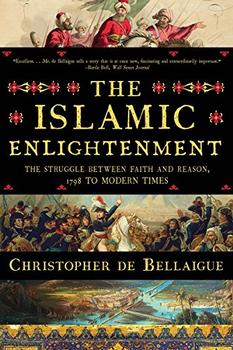Summary | Excerpt | Reading Guide | Reviews | Beyond the book | Read-Alikes | Genres & Themes | Author Bio

"Islam," Michel Houellebecq once said, "is a most stupid religion. When one reads the Koran, one is utterly crushed." These remarks, given during an interview with the French literary magazine, Lire, following the publication of his third novel, Platform, unsurprisingly sparked outrage. Liberation, a Moroccan newspaper, accused him of actively "seeking a fatwa" of the kind handed down to Salman Rushdie following the publication of The Satanic Verses – namely a death sentence as punishment for insulting Islam and the prophet Mohammed. Widely decried as an anti-Muslimist, Houellebecq was summoned before a Parisian court, charged with inciting racial hatred. (He was found not guilty.)
You can imagine, then, the sense of dread in many quarters prior to the publication of Submission, Houellebecq's sixth novel, which depicts a France in the near-future under total Islamic rule. Readers and commentators alike braced themselves for another controversial and deliberately provocative swipe at the religion Houellebecq, in the same interview for Lire, claimed to "hate." This author, however, likes nothing more than subverting expectations – and it is exactly what he does here.
In Houellebecq's France of 2022, the country's ultra-right political party, the National Front led by Marine le Pen (both party and leader taken from real life), is rapidly gaining ground. Phrases like "indigenous Europeans" and "nativism" abound as racism, xenophobia, and a suspicion of outsiders take hold. To prevent Le Pen and her party from coming to power, the Socialist party and the Muslim Brotherhood combine forces, a move which gives them strength in numbers allowing them to keep Le Pen away from the electoral post. However, the Socialist leaders are weak and slowly the Muslim Brotherhood becomes the dominant political force. Before long, the country is an Islamic state ruled by Sharia law. Education is now purely a male-dominated domain, and even the Sorbonne is bankrolled by Saudi Arabia. The book follows François, an academic who specializes in the work of French novelist Joris Karl Huysmans [pronounced zhoh-rees kahrl wees-mahn], as he bears witness to the gradual "submission" of France to the rule of Islam.
The strength of this book lies in the fact that the plot, although at first glance appearing outlandish, is actually entirely plausible. In western Europe today, a noticeable shift towards the right of the political spectrum is underway, as isolationist rhetoric gets ever louder and some countries move to close national borders in response to the waves of migrants and refugees flooding in from war-torn countries like Syria - a move that a correspondent in the New Statesman called "creeping fascism.") Houellebecq simply extrapolates from the prevailing political climate, and in doing so highlights the dangers of extreme politicking, not just by right-wing conservatives but also by left-wing liberals. Submission additionally underlines the dangers of political apathy among the electorate in the face of such moves. In the book, the public at large bury their heads in the sand, becoming inured and almost accepting of the violence, riots and media blackouts that have become almost everyday occurrences. As François states in the book: "I realized – I'd known for years – that the widening gap, now a chasm, between the people and those who claimed to speak for them, the politicians and journalists, would necessarily lead to something chaotic, violent, and unpredictable. For a long time France, like all the other countries of Western Europe, had been drifting towards civil war."
Despite the controversial subject matter, and Houellebecq's well-established reputation as an agent provocateur, there is no hysterical scaremongering to be found in this novel. It is a thoughtful, considered, well-informed imagining of an Islamic France. The religion itself and its leaders are, if anything, portrayed in a largely positive light. The reintroduction of religion into the everyday lives of the French people is an antidote to the widespread dissatisfaction, loneliness and lack of fulfilment that had been engendered by decades of living in a shallow consumerist society.
That said, Houellebecq doesn't shy away from the less desirable consequences of living in an Islamic state, particularly for women. In his re-imagined France of the future, polygamous marriage is the norm. Having been stripped of hard-earned equal rights, women have become shadows, existing only to service the patriarchy, domestically and sexually. On the flipside, society has become desexualized as a result, with women no longer being publically objectified by men. This is very interesting coming from an author such as Houellebecq who has also been accused of misogyny and been roundly criticized for his graphic portrayals of sex in previous novels.
So, does Submission bring us any closer to understanding its author? Is Michel Houellebecq really the Islamophobe and misogynist he is often depicted as? Or is he just a fearless novelist honestly presenting prevailing societal attitudes? This reader remains undecided.
Just to focus on this question, however, misses the point of the book. Submission is so much more than a promotional vehicle for the cause célèbre that is Houellebecq himself. It is an augury, a feasible portent, a herald of a "maybe" future, with the author its possibly prescient avant-courier. More than anything, for good or ill, this is very much a book for our times.
Post Script: In a terrible twist of fate, Submission was first published in France on January 7, 2015 – the same day as the horrific shootings of journalists at the offices of French satirical magazine, Charlie Hebdo, which were carried out by radicalized Muslim extremists in reprisal for what they viewed as the magazine's insults against their religion. And by further dreadful coincidence, the cover of the magazine that particular week featured a caricature of Houellebecq himself. The novelist cancelled all promotional work and had to submit himself to police protection and go into hiding. Not quite a fatwa, but close enough.
![]() This review was originally published in The BookBrowse Review in October 2015, and has been updated for the
November 2016 edition.
Click here to go to this issue.
This review was originally published in The BookBrowse Review in October 2015, and has been updated for the
November 2016 edition.
Click here to go to this issue.

If you liked Submission, try these:

by Christopher de Bellaigue
Published 2018
A revelatory and game-changing narrative that rewrites everything we thought we knew about the modern history of the Islamic world.

by Leila Aboulela
Published 2017
A versatile prose stylist... [Aboulela's] lyrical style and incisive portrayal of Muslims living in the West received praise from the Nobel Prize winner J. M. Coetzee... [she is] a voice for multiculturalism." - New York Times
Your guide toexceptional books
BookBrowse seeks out and recommends the best in contemporary fiction and nonfiction—books that not only engage and entertain but also deepen our understanding of ourselves and the world around us.